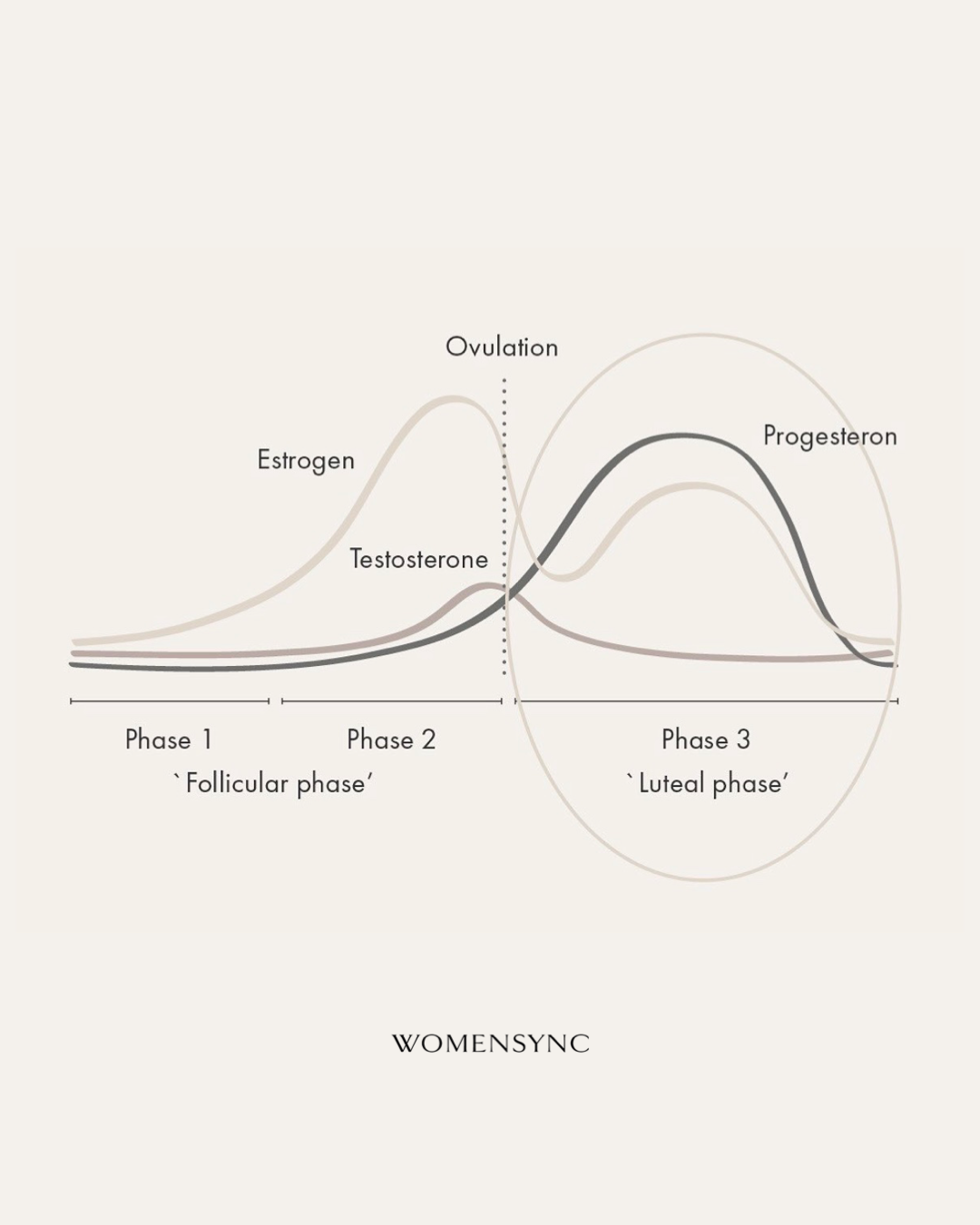How do I extend a short luteal phase? It's a question we've been asked several times lately, so today we thought we'd dive into it.
A short luteal phase is counted as 11 days or less and a normal luteal phase as 12-16 days. To understand why you have a "short luteal phase" and what it means, we first need to understand the basics of the menstrual cycle. When we think about the menstrual cycle, we often think that the period itself, i.e. the days we bleed, is the "central" part of the menstrual cycle, but this gives a wrong picture as it is actually ovulation that is the main event. If we have a weak (not qualitative) ovulation, it can be expressed during the menstrual cycle in the form of, for example, increased PMS, difficulties in conceiving, increased risk of miscarriage, a longer follicular phase (phases 1 and 2 of the menstrual cycle) or a short luteal phase (phase 3 of the menstrual cycle).
Progesterone and estrogen linked to a short luteal phase
When we do not ovulate or have a weak ovulation, we produce less, or in some cases none, progesterone, which is an extremely important hormone for us women. One could say that progesterone is one of the most central players when it comes to prolonging a short luteal phase. We also need enough estrogen to have a good egg quality and to be able to push through a proper ovulation. In other words, we need a good balance between estrogen and progesterone in order for us to feel as good as possible.
How estrogen is linked to a short luteal phase
Estrogen is our dominant hormone in the first part of the menstrual cycle (phase 1 and phase 2), which is also called the follicular phase. The follicular phase lasts from the first day of your period until you ovulate. This phase can vary in time for different women, if you have difficulty ovulating, have PCOS or are exposed to a lot of stress, your ovulation can be postponed and then it is simply the follicular phase that is prolonged.
How does estrogen affect us during the menstrual cycle? Estrogen is the hormone that contributes to growth, makes us "juicy" (more secretions), outgoing, contributes to an increased sex drive and much more.
How progesterone is linked to a short luteal phase
Progesterone on the other hand is dominated during the second half of the menstrual cycle (phase 3) which is also called the luteal phase. The luteal phase begins the day after you ovulate and lasts until you get your period. Progesterone is only produced after ovulation from something called the corpus luteum. The corpus luteum is the former ovarian cyst. At ovulation, the ovary releases an egg that either gets fertilized (you get pregnant) or dies. What remains of the egg sac then becomes the corpus luteum. The reason why it is important to ovulate is because it is the corpus luteum that produces progesterone and this basically only happens when we have ovulated (it is also produced in small amounts in the adrenal glands and adipose tissue). Progesterone is the hormone that balances out estrogen. If estrogen makes us become more "wild and crazy", progesterone is the hormone that contributes to increased calmness and relaxation.
The time after ovulation means we produce progesterone (thanks to the corpus luteum), but the time before ovulation (how you live, eat and sleep) is crucial as it affects the quality of the corpus luteum.
Symptoms of low progesterone
Symptoms of low progesterone can be expressed in difficulty conceiving due to difficulty for eggs to attach and repeated early miscarriages, PMS (too much estrogen in relation to progesterone), a short luteal phase (the corpus luteum dies), increased fatigue We need to have a balance between estrogen and progesterone for us to feel good and achieve hormonal balance.
What does a short luteal phase mean?
What determines how long your luteal phase will be is how long your corpus luteum survives. If you have a short luteal phase, it means that your corpus luteum has a short survival time. It is not strong enough, which can be due to things like nutritional deficiencies, blood sugar problems, thyroid problems, stress or stomach and intestinal problems. In general, it is usually said that a strong and healthy corpus luteum lives for about 12-16 days, after which the period comes (if you are not pregnant). A weak ovulation and a short luteal phase go hand in hand. If you have a weak ovulation, the probability is greater that you will have a short luteal phase as the corpus luteum has not received enough resources in the form of nutrition, building blocks to create hormones, recovery and the like in order to survive.
How do I know if I have a short luteal phase?
To know how long your luteal phase is and how long your corpus luteum lives, you need to identify when you ovulated. The easiest way to do this is to track your menstrual cycle and measure your basal body temperature. When you have ovulated, the body temperature rises between 0.2-0.4 degrees, where the temperature rise lasts at least three days, but preferably the entire phase, which is a sign of a strong corpus luteum and that you are producing enough progesterone.
The luteal phase is always "fixed", which means that if you have ovulated, it will be 16 days at most. If more than 16 days have passed since you ovulated, it is an early sign that you are pregnant.
How do I extend my luteal phase and raise my progesterone?
To strengthen a weak ovulation and extend your luteal phase, you need to do the same things you do to strengthen ovulation . You need to get through strong ovulations with mature eggs in order to bring up optimal levels of progesterone which in turn will make your corpus luteum live longer which results in your luteal phase being longer.
However, it is not just about the progesterone. To push through a strong and proper ovulation, you also need to have sufficient levels of estrogen. If you eat too little, exercise too much and are exposed to too much stress, it is common for estrogen levels to be low . So, in other words, we need to have sufficient levels of both to be able to push through an ovulation.
We understand this may sound complex, but it sounds more complex than it is. The great thing about the body being a whole and an integrated system is that we can start at any end to get results. You can influence and strengthen your ovulation (and thus the luteal phase) through your lifestyle in various ways which we go through below.
Reduce stress
Long-term stress is a real culprit for our sex hormones, because when we are stressed, the body will prioritize stress (survival) over creating hormones such as estrogen and progesterone. This affects the quality of our egg and thus how our luteal phase turns out. Stress can be both internal and external in the form of eating too little, poor sleep, exercising too much in relation to recovery, drinking too much caffeine, nutritional deficiencies or a generally stressful everyday life.
Stabilize your blood sugar
A blood sugar that goes on a roller coaster is a stress for the body. In order to push through a strong ovulation, the body needs to feel that it is safe enough to carry a child (regardless of whether you want to get pregnant or not). Eating a proper breakfast in the morning filled with high quality fats and protein combined with slow carbohydrates can make a big difference. Another tip is to reduce fast and processed carbohydrates, which often cause our blood sugar to peak and then crash again soon.
Eat enough
What we eat will have an effect on the quality and development of our eggs. If we get too little food, there are not enough resources to produce our sex hormones or prioritize our reproductive system. If we have nutrient deficiencies due to not eating enough nutrients in our diet or because we cannot absorb the nutrients in what we eat, this will also have an impact on the production of our hormones and the development of our eggs.
Recovery as a priority
Recovery is essential for our body to feel confident enough to choose fertility over survival. Getting rest, sleep, enjoyment and having fun are parts that are important aspects for the body to be able to shift from being in stress (fight-or-flight mode), that is, from the sympathetic nervous system to the parasympathetic nervous system. It is in the parasympathetic nervous system that the body has the conditions and opportunity to prioritize healing, produce sex hormones, digestion, skin and hair - processes that are not vital for our survival but for our quality of life.
In summary
The best way to prolong your luteal phase is to promote ovulation. You need to get through a proper ovulation with a healthy and strong egg to in turn get a strong corpus luteum that produces enough progesterone to survive more than 12 days. You can often deal with this through your lifestyle in the form of getting the right nutrition through food and supplements, getting enough recovery in relation to stress and above all enjoying life and not taking it too seriously. Many times all the information we receive can be overwhelming, take with you what feels right for you whether it's one thing or 10 things. You know what is right for you in your process!
And remember that it is not the goal that is important, but the process to get there. It takes about 3 months for an egg to mature, which means that the changes you make now may see an effect in three months. Also the time until ovulation will have a big effect on how your luteal phase will be. Remember that this is not a "quick fix". Balancing your hormones can take time and you need to be patient, be consistent and don't give up!

